
"Waterfalls" is a song by American hip-hop group TLC, released by LaFace and Arista as the third single from their second album, CrazySexyCool (1994), on May 22, 1995 in the United States, followed by a United Kingdom release on July 24, 1995.

"Queer" is a song by American rock band Garbage from their self-titled debut studio album (1995). The song started as a demo during sessions between band members Butch Vig, Duke Erikson, and Steve Marker, and finished after singer Shirley Manson joined the band. Manson rewrote the sexualized lyrics to be more ambiguous, and rearranged the song into a subdued trip hop and rock crossover composition.
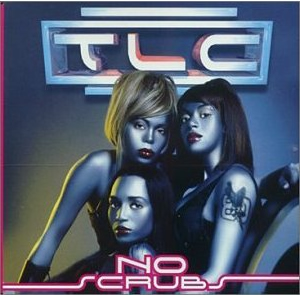
"No Scrubs" is a song recorded by American girl group TLC as the lead single from their third studio album, FanMail, released on February 2, 1999, by LaFace Records and Arista Records. The song was written by producer Kevin "She'kspere" Briggs, former Xscape members Kandi Burruss and Tameka "Tiny" Cottle, and TLC member Lisa "Left Eye" Lopes. The song lyrics describe the role of a man in a relationship. Rozonda "Chilli" Thomas sings the lead vocals for the first time on a TLC single.

"When the Lights Go Out" is the second single released from British group Five's debut studio album, Five (1998). It was released in early 1998. The song was co-written by the group alongside Eliot Kennedy, Tim Lever and Mike Percy, and John McLaughlin. It was co-produced by Kennedy, Lever and Percy, with the US version receiving additional production from Cutfather & Joe.

"This Is How We Do It" is the debut single of American singer-songwriter Montell Jordan. It was released by Def Jam Recordings on February 6, 1995, as the lead single from his debut studio album of the same name (1995). The single was Def Jam's first R&B release, and is Jordan's signature song.
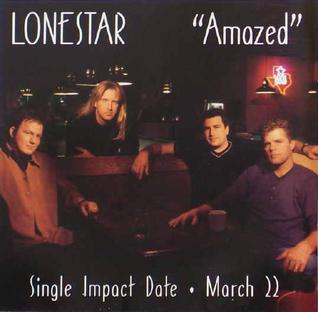
"Amazed" is a song by American country music group Lonestar, released on March 22, 1999, to country radio as the second single from their third studio album Lonely Grill (1999). The power ballad is the band's longest-lasting number one single and biggest hit, spending eight weeks at the top of the Billboard country chart. The song was written by Marv Green, Aimee Mayo, and Chris Lindsey. A pop remix of the song reached number one on the Billboard Hot 100 and number two on the Hot Adult Contemporary Tracks charts in 2000. The song has sold over 1,650,000 digital copies in the US as of February 2016.
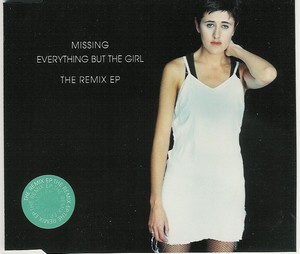
"Missing" is a song by English musical duo Everything but the Girl, taken from their eighth studio album, Amplified Heart (1994). It was written by the two band members, Tracey Thorn and Ben Watt, and was produced by Watt and John Coxon. It was taken as the second single off the album on 8 August 1994 by Blanco y Negro Records in the United Kingdom and by Atlantic Records in the United States. It initially did not achieve much success until it was remixed by Todd Terry and re-released in 1995, resulting in worldwide success, peaking at or near the top of the charts in many countries. The release of the remixed version of "Missing" gave an indication of the band's future experimentation with more electronic dance music on subsequent albums.

"Peek-a-Boo" is a song by English rock band Siouxsie and the Banshees. It was released in 1988 as the first single from the band's ninth studio album, Peepshow. Melody Maker described the song as "a brightly unexpected mixture of black steel and pop disturbance" and qualified its genre as "thirties hip hop". "Peek-a-Boo" was rated "Single of the Week" in both Sounds and NME. Sounds wrote that it was a "brave move", "playful and mysterious". NME described it as "Oriental marching band hip hop" with "catchy accordion." They then said : "If this nation was served by anything approaching a decent pop radio station, "Peek A Boo" would be a huge hit."

"Tell Me When" is a song by English synth-pop band the Human League, released in December 1994 by East West Records as the first single from their seventh album, Octopus (1995). Written jointly by lead singer Philip Oakey and Paul C. Beckett, the song was produced by Ian Stanley. It peaked at number six on the UK Singles Chart, while reaching number four on the UK Dance Chart. In the US, it peaked at number 31 on the Billboard Hot 100, number 15 on the Billboard Hot Dance Club Play chart and number eight on the Cash Box Top 100. The music video for the song was directed by Andy Morahan and filmed in the Czech Republic.

"Swear It Again" is a song by Irish boy band Westlife. The ballad was released on 19 April 1999 in the United Kingdom as the first single from their debut album, Westlife (1999). The song peaked at number one on the UK Singles Chart for two weeks, giving Westlife their first of 14 UK number-one singles. "Swear It Again" is Westlife's only single to have charted in the US, peaking at number 20 on the Billboard Hot 100 and ranking number 75 on the Billboard Hot 100 year-end chart in 2000.

"So Help Me Girl" is a song written by Howard Perdew and Andy Spooner and recorded by American country music singer Joe Diffie. It was released in January 1995 as the third single from his fourth studio album, Third Rock from the Sun (1994). The song reached number two on the Billboard Hot Country Singles & Tracks chart, where it debuted at number 59 for the week of February 4, 1995, and number 84 on the Billboard Hot 100.

"It Only Takes a Minute" is a 1975 song by American soul/R&B group Tavares, released as the first single from their third album, In the City (1975). The song was the group's only top-10 pop hit in the United States, peaking at number 10, and their second number one song on the American soul charts. On the US Disco chart, "It Only Takes a Minute" spent five weeks at number two and was the first of four entries on the chart. The song was subsequently covered by Jonathan King performing as 100 Ton and a Feather in 1976 and by boy band Take That in 1992.

"Never Forget" is a song recorded by English boy band Take That, included as the sixth track on their third studio album, Nobody Else (1995). Written by Gary Barlow and produced by Brothers in Rhythm and Dave James, it features Howard Donald on lead vocals. A remixed version of the song produced by Jim Steinman was released as a single on 24 July 1995 by RCA and BMG and became the band's seventh number one on the UK Singles Chart, remaining at number one for three weeks. Robbie Williams left the band during the promotion of the song. Its music video was directed by David Amphlett. In 2018, "Never Forget" was included in American Billboard magazine's list of the "100 Greatest Boyband Songs of All Time".

"My Love Is for Real" is a song by American singer and songwriter Paula Abdul with backing vocals from Israeli singer Ofra Haza. It was released on May 30, 1995 by Virgin and Captive, as the first single from Abdul's third studio album, Head over Heels (1995). Intended as Abdul's comeback single, "My Love Is for Real" reached number one in Hungary and the top 20 in Australia, Canada, and New Zealand, but it stalled outside the top 20 in the United States, peaking at number 28 on the Billboard Hot 100, and failed to make a major impact in Europe. The song's music video was directed by Michael Haussman.

"Babe" is a song by English boy band Take That, released in December 1993 by RCA and BMG as the fourth single from the band's second album, Everything Changes (1993). Written by bandmember Gary Barlow, it features Mark Owen on lead vocals. Production was led by David Clayton, who later spent 10 years as keyboard player and backing vocalist with Simply Red. Accompanied by a music video directed by Gregg Masuak, the song was a number-one hit in both Ireland and the United Kingdom while peaking within the top 10 in Belgium, Finland, Germany, Israel, Lithuania, the Netherlands, Norway, Sweden and Switzerland.
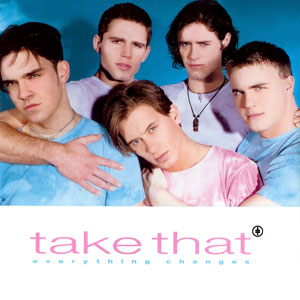
"Everything Changes" is a song by English boy band Take That. Released as the fifth single from the band's second studio album, Everything Changes (1993), and written by Gary Barlow and producers Michael Ward, Eliot Kennedy and Cary Bayliss, the song features Robbie Williams on lead vocals.

"I Want You Back" is a song by American boy band NSYNC, from their debut studio album, NSYNC (1997). It was released in Germany on January 15, 1997, as the band's debut single. The dance-pop and pop song was later released in the United States on February 17, 1998, and in the United Kingdom on February 15, 1999. It was written by Max Martin and the producer Denniz Pop. In its initial release, "I Want You Back" peaked at number four in Germany, and topped the charts in the Netherlands. After releasing internationally, the song charted at number 13 on the US Billboard Hot 100, and at number five on the UK Singles Chart. Two music videos for "I Want You Back" were released for the song's initial release and global re-release, which were directed by Alan Calzatti, and Jesse Vaughan and Douglas Biro respectively.
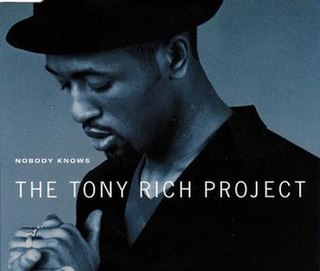
"Nobody Knows" is a song by R&B singer Tony Rich from his 1996 debut album, Words. Released as his debut single on November 7, 1995, the song peaked at number two on both the Billboard Hot 100 and Billboard Hot Adult Contemporary Tracks charts. It also became a hit in several other countries, topping the Irish Singles Chart and reaching number two in Australia and Canada, number four in the United Kingdom, and the top 20 in the Netherlands, New Zealand, and Sweden. Rich received a nomination for the 1997 Grammy Award for Best Male Pop Vocal Performance.

"100% Pure Love" is a song recorded by American singer and songwriter Crystal Waters from her second studio album, Storyteller (1994). It was released on April 11, 1994 by Mercury and A&M (UK), as the album's lead single. The song was a hit in many countries, reaching the top 20 in Australia, Finland, the Netherlands, Switzerland, the United Kingdom, and the United States. It is certified platinum in Australia and gold in the US. In 1995, it was awarded the prize for Top ASCAP Dance Song. And its accompanying music video, directed by Marcus Nispel, was nominated for Best Dance Video at the 1994 MTV Video Music Awards.

"Automatic Lover (Call for Love)" is a song by German Eurodance/pop music project Real McCoy (also known as M.C. Sar & The Real McCoy), released in January 1994 by Hansa as the second single from their album Another Night (1995), which is the US version of the project's second album, Space Invaders. The song was produced by music producers Juergen Wind (aka J. Wind) and Frank Hassas (aka Quickmix) under the producer team name Freshline, and borrows the melody from Bronski Beat's 1984 song, "Smalltown Boy". It was a top-20 hit in a number of countries, including Australia, Denmark, Germany and Sweden. There were made two different music videos for "Automatic Lover (Call for Love)". The European version was directed by Angel in 1994.





















